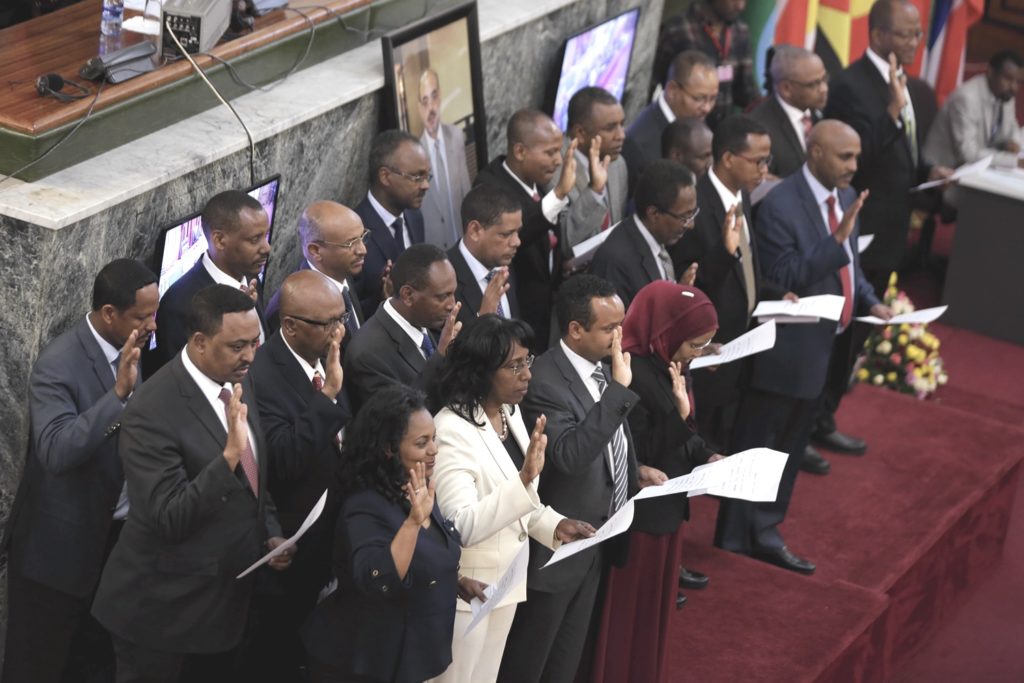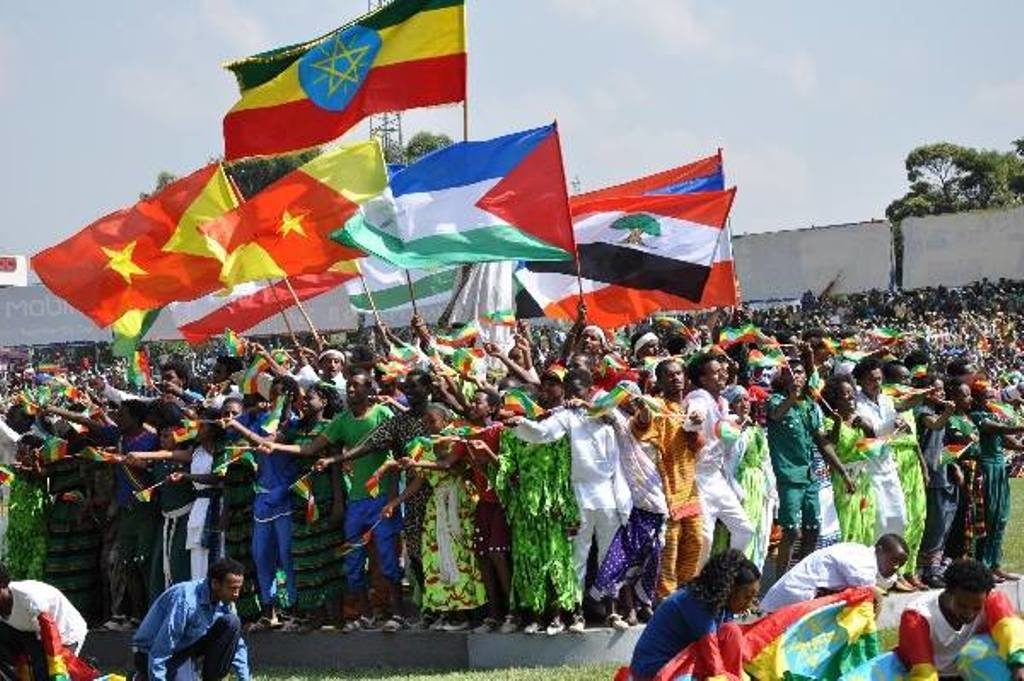This article was originally published in the 5th issue (October 2016) of The Ethiopian Messenger, the quarterly magazine of the Embassy of Ethiopia in Brussels.
After unprecedented and violent protests in the last couple of months, a state of emergency was declared on 8 October 2016 and effectively restored peace. To go further, authorities are currently engaged in a series of far-reaching reforms aiming at correcting shortcomings, and addressing the grievances of the Ethiopian people.
Ethiopia has seen unprecedented violent protests in the last couple of months. These protests have led to the destruction of hard-won investments, loss of life and it has created sense of insecurity among Ethiopians and foreigners. Since the declaration on 8 October 2016 of a state of emergency to avoid additional loss of life and destruction of property, calm has returned in Ethiopia and many of the restrictions have already been lifted. Although the state of emergency was effective in restoring peace, the Ethiopian government does not intend to stop there. Authorities are currently engaged in a series of far-reaching reforms aiming at correcting any existing shortcomings, addressing the grievances of the Ethiopian people and ultimately, launching the second renewal of the coalition governing party.
Immediate measures
The series of political measures started with the establishment of an independent inquiry commission to assess the cause of loss of life in the wave of unrest that started in the two regional states of Oromia and Amhara in November 2015. Details regarding the people arrested under the state of emergency have been made public. More than 2500 persons have been released after a brief detention. These actions proved effective, and in less than two months since the declaration of the state of emergency, many measures had already been eased, including the lifting of travel restriction for diplomats and limitations on mobile data service.

There are several encouraging signs that the government is taking heed of protesters’ demands. At the end of October 2016, Prime Minister Hailemariam Desalegn conducted a major cabinet reshuffle, changing 21 of 30 ministerial posts, including bringing in 15 new appointees. The new cabinet is less political and more technical: all the new appointees are technocrats who do not belong to any political party, and will take over important portfolios including trade, health, water and electricity, farming and the environment. Many heralded the move, arguing that the selection of technocrats without party affiliation is a positive signal showing the government is serious about delivering changes and the sign of a new openness. The cabinet is also one of Ethiopia’s most ethnically diverse and includes nine newcomers from the Oromiya region. But these changes are only the first step of a deeper and broader reforms. The EPRDF government is well aware that a sustainable calm – and the country’s political direction – will depend largely on their next move.
Further reforms
Ethiopia is much different compared to what it was 25 years ago. The double-digit economic growth registered in the country for the last thirteen years has spiked expectations and created a richer, more educated society demanding more from the government. In consequence, the key reform programs that will be carried out by the government consist of three major categories: shared and equitable economic growth, expansion of the democratic space and economic restructuring.
On the economic front, even though the progress in investment, social policy and education are acknowledged, dissatisfaction remains, particularly in urban unemployed youths and rural areas where sizable part of the people where not satisfied with the good governance issues when it comes to land appropriation for investment. From the country’s population, an estimated 100 million, over 20 million are unemployed. And this is an area the government has attached due consideration, even if the economy has been creating 1.6 million jobs a year. Significant portion of the population did not fully benefit from the development projects, especially the youth who were the spearhead of protest and who are making demands that are socio- economic rather than political. As the youth aged between 15 and 30 make up 50 percent of the population, the government is working harder than ever to provide job opportunities more by allocating funds worth billions of birr. For youth employment, a “Revolving Youth Fund” funded to the tune of 500 million dollars – some 4 percent of the annual budget – has already been approved. All this is part of a largely endogenous strategy of industrialization, focused on Small and Medium Enterprises (SME) on the edge of the rural areas, while foreign investment in “Industrial Parks” is also prioritized.
The government has promised a long list of further reforms to solve the root causes of the protests, like fighting corruption, reforming the electoral system so that the voices of those who are not represented can also be heard in the Parliament. The proposals seek to offer a more representative electoral system and will be spearheaded by the Prime minister. Touching upon reforming the electoral system, the Premier said that « we felt that the coming parliament should also accommodate those who are not represented ». Electoral law will also be reformed to introduce an element of proportional representation into the majority rule. Regarding the opening the democratic space, Prime Minister Hailemariam noted the government thoroughly understood the importance of enhancing civic participation, strengthening democratic institutions, particularly on pertinent organs like Human Rights Commission, the Ombudsman, Office of the Federal Auditor General, Federal Ethics and Anti-Corruption Commission.
Towards a renewal of the EPRDF
The first renewal gave clarity in defining democratic developmental state in Ethiopia. Unlike other developmental states, Ethiopia’s democratic developmental state is based on the idea that development alone cannot manage the diversity of the country. Democracy was given prominence and democratization was set in motion. Several efforts have been deployed. However, the result was far from adequate. Therefore, it goes without saying that work on consolidation of democracy is ought to take enough focus and attention. The two pillars of strengthening democratic institutions and building the culture of democracy are of paramount importance and significance.
Democratic developmental program and the resultant policies and strategies are still relevant and valid and this is still an opportunity for EPRDF-led government. As reiterated by EPRDF, the efficient and effective delivery is a matter of life and death and ought to be an overarching concern of the recently declared deep renewal. What is holding Ethiopia back from fully delivering the provisions of the home-grown policies and strategies? Without, « ifs and buts », EPRDF should find an adequate answer to this burning issue. Merit- and competence-based human resource is a key ingredient in the effective discharge of good governance and service delivery. For any progressive government, this is unavoidable. Merit and competence is not in contradiction with fair and just representation.

These developments should be seen in the light of the country’s long history. 25 years ago, EPRDF made the ambitious bet to transform a 3,000-year governance system into a totally different one by building a federal democratic state based on culture and diversity while facing huge challenges such as poverty and a less literate population. Recent experiences have shown that the country is moving in the right direction, but it has not yet come up with inclusive engagement.
Now that the disorders in the country have calmed down, Ethiopian authorities are looking for a long-term solution to the grievances of the population. This year’s unrests took place as the coalition was about to start an extensive process of reflection about its accomplishments and shortcomings since 2001, when the leadership of the ruling party, facing several challenges, engaged in a rethinking of its ideological commitments and strategies. In the wake of the 2001 renewal, the government had moved quickly to modernize, professionalize and bureaucratize the state, announcing new emphasis on capacity building, education and urban development. Today, once again, the first goal for the Front will be to internalize the problems, their causes and device resolve accordingly. This will be an ongoing process, with the first specific deadline in June 2017, to report back on the internal changes within the party and examine a document currently in preparation, on what the EPRDF should become in the next ten years. There is a general sense of having embarked upon a period of reflection and change whose outcome will become clear in the upcoming months.
Source: The Ethiopian Messenger, January 2017




